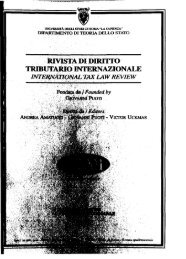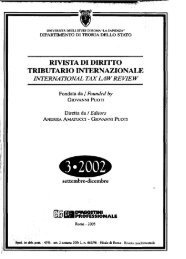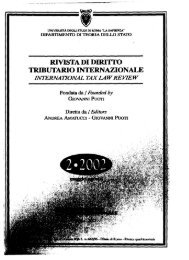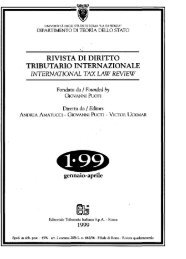RIVISTA DI DIRITTO TRIBUTARIO INTERNAZIONALE - Rdti.it
RIVISTA DI DIRITTO TRIBUTARIO INTERNAZIONALE - Rdti.it
RIVISTA DI DIRITTO TRIBUTARIO INTERNAZIONALE - Rdti.it
You also want an ePaper? Increase the reach of your titles
YUMPU automatically turns print PDFs into web optimized ePapers that Google loves.
G. Petrillo: lnterpellation in the Statute of Taxpayers' Rights<br />
perfanTI the taxatian abligatians an his behalf (18), may request the in-<br />
in Riv. dir. trib., 1995,1,587. On the same topic, see Fals<strong>it</strong>ta, Infonl1aziol1i del fisco e<br />
affidamento del comribuente, in Riv. dir. trib., 1996, II, 294; M. V<strong>it</strong>toria Serranò, Brevi<br />
osservazioni in lenza di tutela dell'aflìdamemo del comribuente nei confronti degli orientamenti<br />
ministeriali alla luce dei recemi imervemi giurispmdenziali, in BolI. trib. No.<br />
3i1997, page 183. As regards the problem of the effectiveness of the interpretation and<br />
infonnation prO\ided by the financial administration to the taxpayer, a solution aimed<br />
to prO\ide incisive protection far the taxpayer's trust has been developed in the German<br />
system by means of the dual principle of Trcu und GIauben and Vertrauesschutz;<br />
on this topic, see. G. Fals<strong>it</strong>ta, Per Wl fisco"civile", Milan, 1996.<br />
In particular, on good fa<strong>it</strong>h in the case of changes in interpretation in peius, also<br />
w<strong>it</strong>h reference to the protection afforded in the German legai system, see L. Ferlazzo<br />
Natoli- M. V<strong>it</strong>toria Serranò- Gaetano Ruta, Tutela extragiudiz.iale del cO/ltribueflte nell'ordinamento<br />
tributario. Ruling e Ver(assungsbeschwerde, Turin, 1998., from the comparative<br />
standpoint the considerations reached are extremely stimulating: in the light<br />
of the Gennan experience (verfassungsbeschv,:erde), <strong>it</strong> is said, in the most concise<br />
tenns, that "direct appeal by the taxpayer to the Const<strong>it</strong>utional Court would const<strong>it</strong>ute<br />
the highest fonn of guarantee as regards the protection of the taxpa:ying c<strong>it</strong>izen<br />
in relation to the Revenue Department.".<br />
Lastly, also w<strong>it</strong>h reference to the principle of law recently expressed by the<br />
Supreme Court ( sentence No. 14619 of 10th November 2000), see M. Buzzone, La<br />
natura giuridica di circolari, risoluzioni e pareri, in Corro trib., No. 4/2001, page 245; C.<br />
Grimaldi, Le interpretazioni ministeriali non sono vincolanti per il giudice nella decisione<br />
della controversia, in Riv. giuro trib., n. 6/2001, p. 489 et seq.<br />
In particular, paragraph 2 establishes the protection of trust by prohib<strong>it</strong>ing the<br />
application of fines and the claiming of interest for late pa)Tllent if the behaviour of<br />
the taxpayer has been due to events, delays or errors for which the financial administration<br />
can be held responsible. Paragraph 3 then proceeds to confer the status of<br />
generai principles on provisions already existing in the fiscale penalties system, by excluding<br />
punishabil<strong>it</strong>y in the case that behaviour in contrast \v<strong>it</strong>h the lav.' is due to objective<br />
cond<strong>it</strong>ions of uncertainty on the scope and range of application of the tax regulation.<br />
Il also foresees that penalties cannot be applied in the presence of violations<br />
of an exclusivelv formaI nature, which therefore do not cause anv detriment to fiscal<br />
ascertainments "and do not affect the tax amount. Lastly, attentiòn must be called to<br />
the last sentence in paragraph 3, , .. "hich excludes the invalidation of contracts due to<br />
\iiolations of pro\iisions of exclusively fiscal relevance.<br />
In particular, in relation to the interaction between the duty of good fa<strong>it</strong>h and the<br />
right to information pursuant to Art. 5 of Law No. 212/2000, see M. V<strong>it</strong>toria Serranò,<br />
Il dir<strong>it</strong>to all'infonna::..ione e la tutela della buona fede nell'ordinamento tributario <strong>it</strong>aliano,<br />
in Riv. dir. trib., No. 2/2001, page 32 t. F. Benfatti, Prùlcipio di bU011a fede e obbligaz.ione<br />
tn'butaria (appunti per una discussione), in Boll. Trib., 1986, page 974 et seq., remarks<br />
that: "there exists by virtue of the principle of good fa<strong>it</strong>h a duty of information on the<br />
part of the revenue department that must be performed taking into account the different<br />
levels of education and experience of the taxpayers so as to make correct compliance<br />
w<strong>it</strong>h the law possible for everybody". As regards the consideration, in tenns<br />
of generai theory, of the causai nexus between knowledge information and legaI certainly,<br />
see Pugliatti, Conoscenza e dir<strong>it</strong>to, Milan, 1961.<br />
(18) The parties leg<strong>it</strong>imately ent<strong>it</strong>led to present the request include: \\<strong>it</strong>hholding<br />
agents as per Art. 23 of Presidential Decree No. 600 of 29th September 1973, "'''<strong>it</strong>h re-<br />
RI"V1STA DJ <strong>DI</strong>RITIO <strong>TRIBUTARIO</strong> INTER.\AZIONALE 312001






